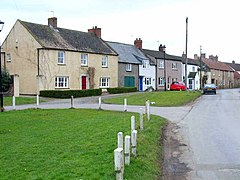Crakehall
| Crakehall | |
|---|---|
 The east end of the village, known as Great Crakehall. |
|
| Crakehall shown within North Yorkshire | |
| Population | 677 (including Rand Grange. 2011) |
| OS grid reference | SE243899 |
| • London | 203 mi (327 km) SSE |
| District | |
| Shire county | |
| Region | |
| Country | England |
| Sovereign state | United Kingdom |
| Post town | BEDALE |
| Postcode district | DL8 1 |
| Dialling code | 01677 |
| Police | North Yorkshire |
| Fire | North Yorkshire |
| Ambulance | Yorkshire |
| EU Parliament | Yorkshire and the Humber |
| UK Parliament | |
Crakehall is a village and civil parish in the Hambleton district of North Yorkshire, England, approximately 2 miles (3 km) west of Bedale. The village lies along the route of the A684 and is split into two parts by Bedale Beck, a tributary of the River Swale. The population as taken at the 2011 Census was 677. The north-west part is known as Little Crakehall, and the south-east part as Great Crakehall. It is 8.3 miles (13.4 km) west-south-west of the county town of Northallerton.
The village is mentioned in the Domesday Book as Crachele. It was part of the head manor of Masham. The manor lands were split between Gilli and Ulfkil before the Norman conquest. After 1086 the manor was tenanted to two men-at-arms of the household of Count Alan of Brittany. The line of descent for the manor follows that of Ribald of Middleham, whose main tenants were named 'Crakehall', until 1624. From then it was granted by the Crown to Edward and Robert Ramsay until they granted it to John Heath and John White around 1658. Records thereafter are unclear until mention of the manor being in the possession of the Place family in the early 18th century. From 1732 to 1810 the manor was passed from Henry Goddard via Mary Turner, Watson Bowman and Anthony Hardolph Eyre to Henry Pulleine. Pulleine's grandadughter, Lady Cowell, inherited in the late 19th century. That part of the manor that was in Little Crakehall was held by the 'Crakehall' Family until the 14th century and it eventually passed to Christopher Conyers of Hornby whose descent it followed thereafter.
The etymology of the name of the village is made of the Old Norse word kráka meaning crow or raven and the Anglian word halh meaning a nook of land. Kráka could also have been the given name to a person.
On the Bedale Beck is the 17th-century corn mill, once owned by the Neville family of Middleham Castle. The mill closed in 1930 and lay derelict until it was restored in 1980. It is open in the summer.
...
Wikipedia

